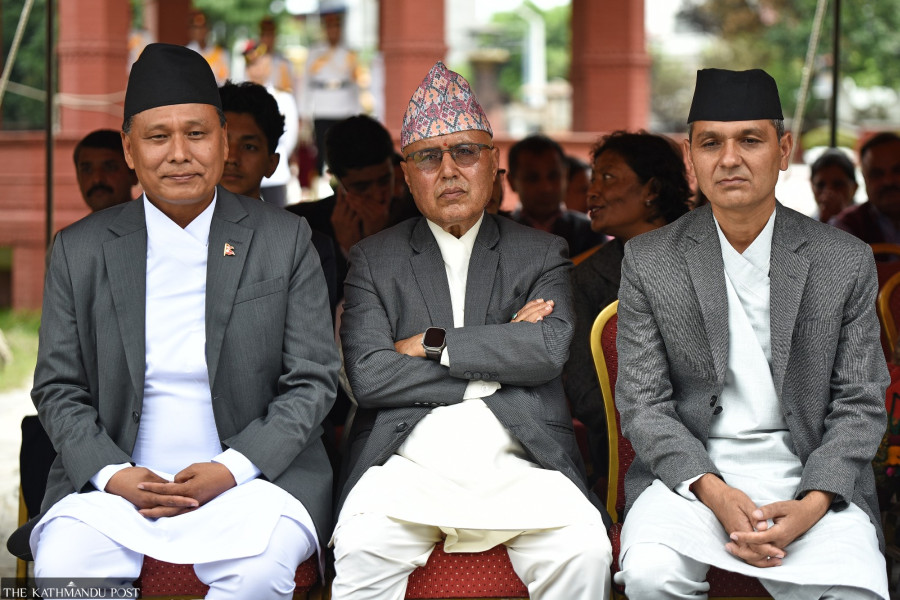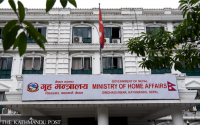National
Fallen demonstrators declared martyrs
Families of deceased will receive Rs1.5 million each. A national day of mourning on September 17.
Anil Giri
The government on Monday declared those who died in the recent Gen Z uprising as martyrs, and decided to provide cash relief to their families.
From now on, the deceased will be called Gen Z martyrs, according to the government’s decision.
As many as 72 people have died from last week’s anti-government protests called by Gen Z youths, and hundreds remain hospitalised across the country.
A Cabinet meeting on Monday declared the deceased as martyrs, Home Minister Om Prakash Aryal informed after the meeting. Following tradition, the government will provide one million rupees to each bereaved family, and an additional Rs500,000 to cover other expenses. This was the first Cabinet meeting after Sushila Karki was appointed prime minister on September 12. Three ministers were also sworn-in earlier on Monday.
Aryal added that the funerals of the deceased would be held with national honours, and a day of mourning would be observed on September 17, with the national flag flown at half-mast. The government will ensure that the bodies are transported to the respective home addresses of the deceased, and for those from remote districts, it will bear the transport and air travel costs. He added that investigating the use of force during Gen Z protests remains his top priority.
The compensation will be released through the Ministry of Finance and distributed via the respective district administration offices.
A decision was also made to continue providing free medical treatment for the injured.
Separately, Nepal Police announced that it will provide one million rupees each to the families of police personnel killed during Gen Z protests. The assistance will be funded by deducting the salaries from all ranks, including that of the Inspector General, said a statement by the Nepal Police.
A judicial inquiry commission will be formed to investigate the incidents during the Gen Z movement. The commission will be headed by a former judge of the Supreme Court, said Aryal, adding that its full composition has yet to be finalised.
He also announced a ‘Gen Z Awakening Memorial Park’ in memory of Gen Z martyrs and said search is on for a suitable location
Aryal told reporters that all proposals forwarded by the previous Oli government in the cabinet have been sent back to the respective ministries.
Earlier in the day, three newly appointed ministers took the oath of office and secrecy amid a ceremony at Sheetal Niwas, the President's office, on Monday.
President Ramchandra Paudel administered the oath to Rameshore Khanal as finance minister, Kulman Ghising as minister for energy, water resources and irrigation, and Aryal as minister for home affairs.
Ghising will also lead the Ministry of Physical Infrastructure and Transport and the Ministry of Urban Development, while Aryal has also been assigned the law, justice and parliamentary affairs portfolio for the time being.
As per the revolutionary spirit of the recent Gen Z movement, the new ministers wasted no time in taking some important decisions on Monday.
New Finance Minister Khanal decided to cut small-scale projects presently listed in the budget, with the decision expected to save up to Rs100 billion in government spending.
While addressing ministry staff after assuming office, Minister Khanal said that given the need to conduct elections within six months and carry out reconstruction work, resources should be raised by filtering out and cutting such projects and programmes.
He also formed a three-member task force, led by the head of the Budget Division, to recommend cuts in small-scale projects. This task force will filter existing budgetary projects and set priorities for the more essential projects and programmes.
Referring to the damage caused to Singha Durbar during the Gen Z protests, Minister Khanal said that debris would be cleared quickly and walls repainted.
He also stated that the immediate focus should be on reconstruction of damaged properties. Hundreds of public and private properties were damaged and destroyed during last week's violent anti-corruption protests across the country. The assessment of the damage has yet to be made.
Likewise, Minister of Energy, Water Resources, and Irrigation Kulman Ghising decided to recover outstanding dues from factories and businesses that had refused to clear their past dues for using dedicated feeders and trunk lines during load-shedding years.
Upon assuming office, Ghising issued instructions for the collection of the dues.
Previously, when Ghising was the executive director of the Nepal Electricity Authority, he had pushed to recover such dues from factories and firms that owe billions of rupees to the NEA.
The companies were provided with dedicated electricity supply at the time when general people were facing hours-long power cuts.
Ghising’s insistence to recover the money from the defaulting companies cost him his post under then prime minister KP Sharma Oli, who blocked his efforts.
Now, at the helm of the energy ministry, Ghising has made the recovery of the long overdue payments from businesses his first priority.
In addition to the energy ministry, Ghising will oversee the Ministry of Physical Infrastructure and Transport, and the Ministry of Urban Development.
Around eight years ago, when Ghising first took charge of the NEA, regular power outages were the norm, but under his leadership Nepal was declared free from load-shedding.




 9.21°C Kathmandu
9.21°C Kathmandu














